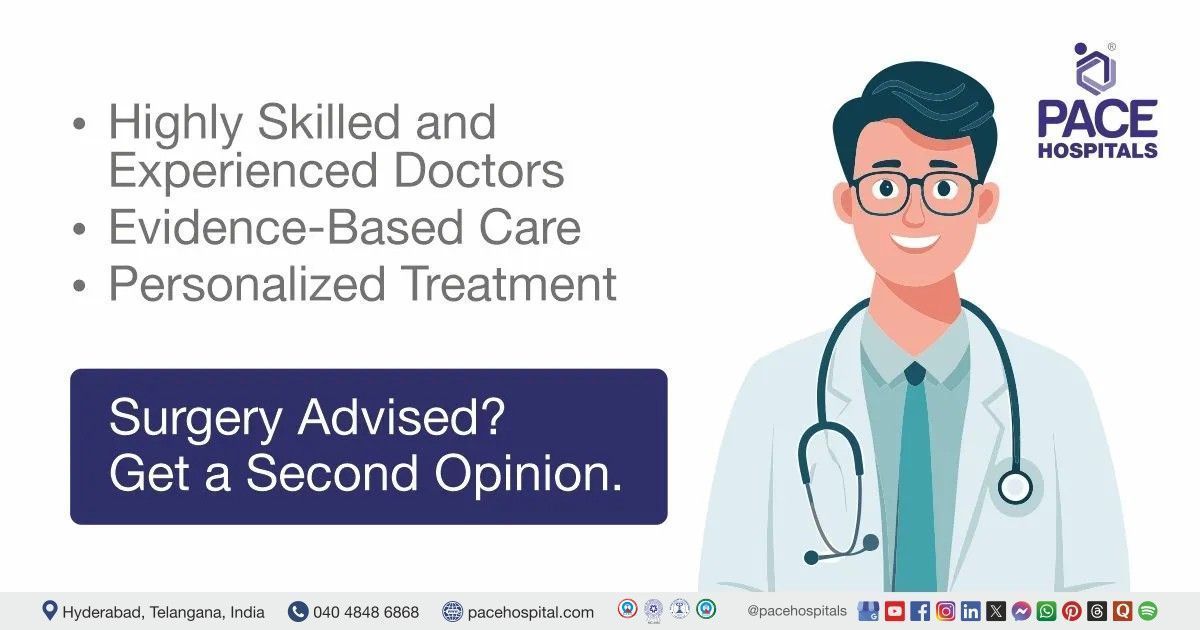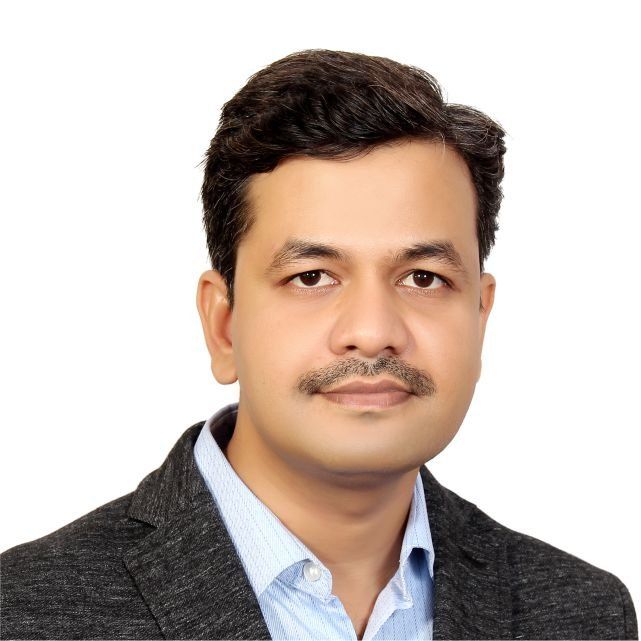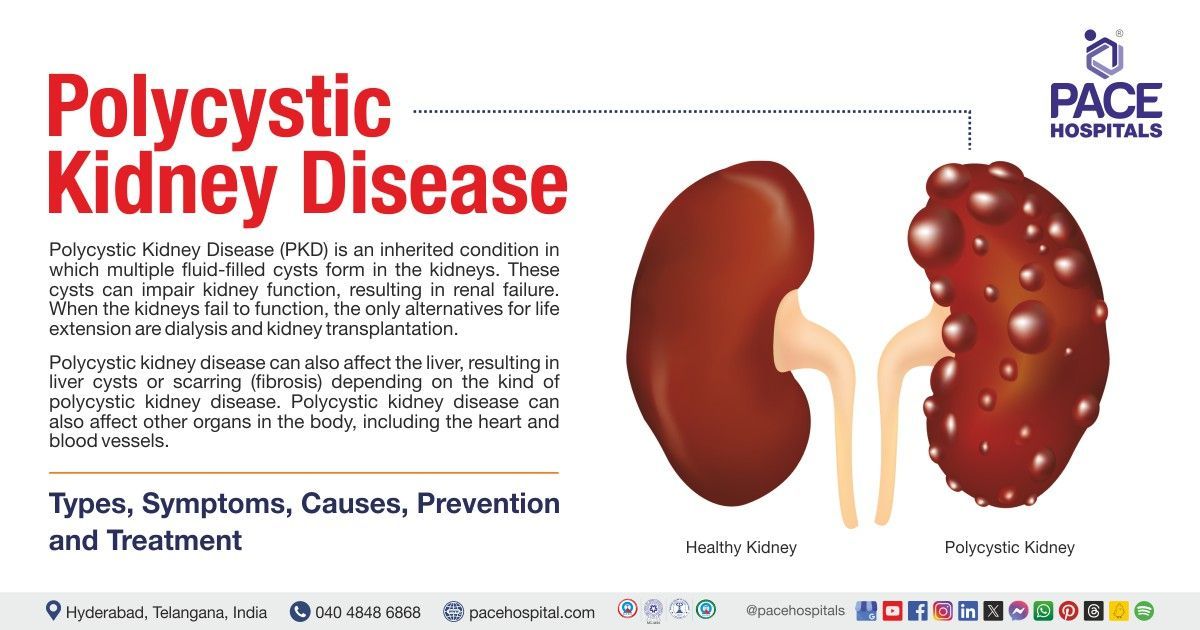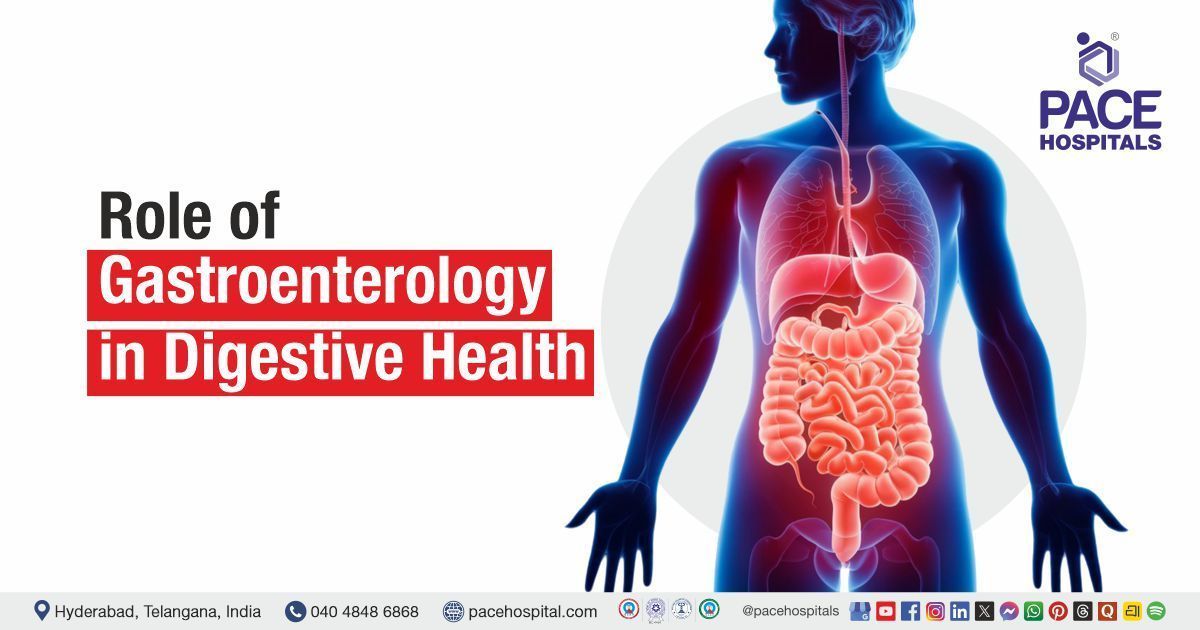Best Polycystic Kidney Disease Doctor in Hyderabad Offering Advanced PKD Treatment
PACE Hospitals
✅ Recommended by 9,452 Happy Patients. Get hassle-free appointments with Polycystic kidney disease specialists.
Dr. A Kishore Kumar
MD (Medicine) (JIPMER), DM (Nephrology) (AIIMS, New Delhi)
Experience : 12+ years
Consultant Nephrologist and Renal Transplant Physician
Specialist
Kidney Transplantation, Glomerular Disease, Chronic Kidney Disease, Acute Kidney Injury, Hemodialysis, Peritoneal Dialysis, Autoimmune Kidney Diseases, Genetic Kidney Diseases, Critical Care Nephrology
Expertise
Permcath Insertions, Kidney Biopsy, Peritoneal Dialysis Catheter Insertion
Consultation Details
Languages Spoken: English, Telugu, Hindi
Timing: Mon to Sat - 10 AM to 6 PM
Location: PACE Hospitals, HITEC City
Dr. Abhik Debnath
MBBS, MS (General Surgery - IMS, BHU), MCh (Urology - CMC Vellore), DNB (Urology)
Experience : 12+ years
Consultant Laparoscopic Urologist, Endourologist, Andrologist & Kidney Transplant Surgeon
Specialist
Specialist in Urological conditions - Kidney stones, Bladder stones, Ureteral stones, Urinary tract infections, Pelviureteric junction obstruction, Chronic kidney disease, Bladder infections, Enlarged prostate, Hydrocele, Overactive Bladder, Interstitial Cystitis, Haematuria, Sexually transmitted infections, Paediatric urological conditions (undescended testicles and bedwetting), Urethral stricture, Urofacial syndrome, Bladder exstrophy, Hydronephrosis, Cancer conditions (bladder cancer, kidney tumour, testicular cancer and prostate cancer), etc.
Expertise
Minimally invasive procedures (endoscopic, laser, laparoscopic and robotic) that includes Renal transplantation and AV fistula creation, Double J stenting, Ureteroscopic lithotripsy (URL), Retrograde intrarenal surgery (RIRS), Percutaneous nephrolithotomy (PCNL), Percutaneous cystolithotomy (PCCL), Cystolitholapaxy, Transurethral resection of the prostate (TURP), Holmium laser prostate surgery (HoLEP), Transurethral resection of bladder tumour (TURBT), Direct vision internal urethrotomy (DVIU), urethroplasty, perineal urethrostomy, etc. In addition, he has special interests in diagnosing and treating overactive or underactive bladder, neurogenic bladder, voiding dysfunction, urological cancers, and urological stones.
Consultation Details
Languages Spoken: English, Hindi, Bengali, Telugu
Timing: Mon to Sat - 9 AM to 6 PM
Location: PACE Hospitals, HITEC City
Dr. K Ravichandra
MBBS, MS (General Surgery), MCh (Urology)
Experience : 11+ years
Consultant Laparoscopic Urologist, Andrologist & Kidney Transplant Surgeon
Specialist
Specialist in Urinary tract infections, Kidney stones, Pelviureteric junction obstruction, Bladder stones, Ureteral stones, Bladder infections, Chronic kidney disease, Enlarged prostate, Overactive Bladder, Hydrocele, Interstitial Cystitis, Sexually transmitted infections, Haematuria, Urethral stricture, Bladder exstrophy, Hydronephrosis, Cancer conditions (bladder cancer, kidney tumour, testicular cancer and prostate cancer), etc.
Expertise
Ureteroscopic Lithoripsy (URSL), Retrograde Intrarenal Surgery (RIRS), Double-J stenting, Percutaneous Nephrolithotomy(PCNL), Percutaneous Cystolithotomy, Cystolitholapaxy, Transurethral Resection of Prostate(TURP), Nephrectomy, Direct Visual Internal Urethrotomy etc.
Consultation Details
Languages Spoken: English, Hindi, Telugu
Timing: Mon to Sat - 9 AM to 6 PM
Location: PACE Hospitals, HITEC City
Dr. Vishwambhar Nath
MBBS, MS (General Surgery), DNB (Urology), M.Ch (Urology)
Experience : 40+ years
Senior Consultant Urologist & Renal Transplant Surgeon
Specialist
Specialist in Minimally Invasive treatments for Kidney Stones, BPH and Bladder Dysfunction, and Urological Cancers with a special interest in Bladder Cancer, Kidney Transplantation, and Laparoscopic and Robotic Urology.
Expertise
Medical and Surgical Treatment for BPH and Bladder Dysfunction, Urological Cancers, Reconstructive and tropical Urology, Minimally Invasive treatments for Kidney Stones, Kidney Transplantation, Evidence-Based Medicine, and Bringing the Art Back Into the Science of Medicine.
Consultation Details
Languages Spoken: English, Hindi
Timing: Mon, Wed, Fri - 11 AM to 1 PM
Location: PACE Hospitals, HITEC City
Top-Rated Polycystic Kidney Disease Treatment Doctor in Hyderabad for PKD Disease Patients
PACE Hospitals stands out for its excellence in managing polycystic kidney disease (PKD), led by some of the best polycystic kidney disease treatment doctors in Hyderabad, India. Our expert team from the Departments of Nephrology and Urology provides patient-centric care for individuals affected by PKD, addressing both early-stage and advanced cases.
Our PKD treatment doctors in Hyderabad are highly skilled in diagnosing and managing the full spectrum of PKD symptoms, including flank pain, high blood pressure (Hypertension), blood in the urine, abdominal fullness, and recurrent urinary tract infections (UTI). Using advanced diagnostic tools such as renal ultrasound, CT scan, MRI, and genetic testing, we ensure accurate assessment and effective treatment planning.
At PACE Hospitals, PKD specialists from our Nephrology and Urology departments offer personalised care plans that may include blood pressure control, pain management, dietary guidance, infection prevention, and strategies to preserve kidney function. For patients with advanced kidney failure, we also provide dialysis services and facilitate access to kidney transplant evaluation and care.
Whether you’re seeking care for a newly diagnosed case of polycystic kidney disease or managing chronic complications, our best Polycystic kidney disease doctor in Hyderabad, India delivers advanced treatment options and compassionate support to improve your kidney health and quality of life.
With a strong focus on clinical excellence, advanced infrastructure, and comprehensive patient care,
PACE Hospitals is your trusted choice when looking for the best Polycystic kidney disease specialist in Hyderabad.
Frequently Asked Questions (FAQs) on Polycystic Kidney Disease (PKD)
What are the early signs and symptoms of PKD?
Early PKD symptoms can be subtle and vary from person to person. Common signs include high blood pressure, back or side pain, frequent urinary tract infections, headaches, and blood in the urine. As polycystic kidney disease progresses, the kidneys may enlarge, leading to abdominal fullness or discomfort. If you experience any of these symptoms, consulting a polycystic kidney disease treatment doctor in Hyderabad at PACE Hospitals can help ensure timely diagnosis and care.
Is polycystic kidney disease hereditary?
Yes, PKD is primarily a hereditary disorder. Autosomal Dominant PKD, the most common form, is inherited when one parent carries the faulty gene. Autosomal Recessive PKD, though less common, occurs when both parents pass on the mutated gene. In rare instances, PKD may result from a spontaneous mutation with no family history. If you have a family history of polycystic kidney disease, it's important to consult a PKD treatment doctor in Hyderabad for genetic counseling and early evaluation.
Which doctor should I consult for polycystic kidney disease?
For managing polycystic kidney disease, it’s important to consult a nephrologist, a doctor who specializes in kidney health. A PKD treatment doctor in Hyderabad—typically a nephrologist—can provide expert care for monitoring kidney function, managing blood pressure, and slowing disease progression. At PACE Hospitals, our best doctors for polycystic kidney disease in Hyderabad offer personalized treatment for every stage of the condition.
Can polycystic kidney disease be cured?
Currently, there is no cure for polycystic kidney disease, but effective PKD treatment can help manage the condition. Treatment focuses on controlling symptoms, preventing complications, and slowing cyst growth. Lifestyle changes, medication, and routine follow-up with a polycystic kidney disease treatment doctor in Hyderabad can improve quality of life. Research is ongoing to develop therapies that may potentially alter the course of the disease in the future.
How does polycystic kidney disease affect other organs?
Though PKD mainly affects the kidneys, it can also cause cysts in the liver, pancreas, and occasionally the spleen. Other complications may include high blood pressure and vascular issues such as brain aneurysms, which require careful monitoring. This makes regular checkups with a PKD treatment doctor essential. At PACE Hospitals, Hyderabad, our multidisciplinary approach ensures comprehensive care beyond kidney-related concerns.
What is polycystic kidney disease?
Polycystic kidney disease (PKD) is a genetic disorder that causes multiple fluid-filled cysts to develop in the kidneys. Over time, these cysts grow and interfere with the kidneys’ ability to filter waste from the blood, potentially leading to kidney failure. PKD can also cause cysts in other organs, such as the liver. While some individuals may live for years without noticeable symptoms, early diagnosis and PKD treatment can help manage the condition effectively.
How does polycystic kidney disease develop?
PKD disease typically occurs due to inherited gene mutations that affect kidney development. The most common form is Autosomal Dominant PKD (ADPKD), where only one parent needs to pass on the gene. A rarer form, Autosomal Recessive PKD (ARPKD), usually appears in infancy and requires faulty genes from both parents. These genetic changes cause the kidneys to develop cysts, which gradually impair function and may require consultation with a PKD specialist for ongoing care.
Is polycystic kidney disease fatal?
Polycystic kidney disease is not immediately fatal but can lead to serious health complications if left untreated. The disease may progress to kidney failure, requiring dialysis or a transplant. Rare but severe complications, such as brain aneurysms or liver cysts, can be life-threatening. However, with early diagnosis, lifestyle changes, and guidance from the best doctor for polycystic kidney disease in Hyderabad, many patients manage the disease and lead long, healthy lives.
Is PKD dominant or recessive?
Polycystic kidney disease can be either dominant or recessive, depending on the type. Most people are affected by Autosomal Dominant PKD (ADPKD), which only requires one affected gene from either parent. Autosomal Recessive PKD (ARPKD), a more severe and less common form, occurs when both parents pass on the defective gene. If you suspect a genetic risk, seek guidance from the best Polycystic kidney disease doctor in Hyderabad, India, at PACE Hospitals for proper diagnosis and family screening.
Can polycystic kidney disease be prevented?
There is currently no known way to prevent polycystic kidney disease (PKD) since it is a genetic condition. However, working with a PKD specialist to manage health can help slow disease progression. Measures include controlling blood pressure, staying hydrated, maintaining a healthy weight, avoiding smoking, reducing salt and caffeine intake, and protecting the kidneys from injury. Early diagnosis and guidance from a PKD treatment doctor in Hyderabad, India can delay complications and preserve kidney function.
How is polycystic kidney disease diagnosed?
PKD disease is typically diagnosed through imaging tests. Ultrasound is the most common and non-invasive method used to detect kidney cysts. In some cases, CT scans or MRI may be recommended for more detailed evaluation. Genetic testing may also be performed when imaging is inconclusive or for those with a family history planning for children. At PACE Hospitals, Hyderabad, our trusted PKD specialists use advanced diagnostic tools for early and accurate diagnosis.
What is the life expectancy with polycystic kidney disease?
Life expectancy for PKD patients depends on the severity of the disease and how well it is managed. With early diagnosis, blood pressure control, and routine care from a PKD doctor, many people live well into their 60s or beyond. If kidney failure occurs, dialysis or a kidney transplant option is available. At PACE Hospitals in Hyderabad, our expert team helps patients manage PKD to maintain a good quality of life for as long as possible.
Can polycystic kidney disease lead to kidney failure?
Yes, polycystic kidney disease can progress to kidney failure, particularly in those with autosomal dominant PKD. As cysts enlarge and multiply, they replace healthy kidney tissue, reducing the kidneys’ ability to filter waste. When kidney function becomes severely impaired, dialysis or a kidney transplant may be necessary. Consulting with the best Polycystic kidney disease specialist in Hyderabad, India at PACE Hospitals can help slow progression and improve outcomes through early intervention.
How is high blood pressure managed in PKD patients?
High blood pressure is a common complication of polycystic kidney disease (PKD) and must be controlled to protect kidney function. PKD specialists often prescribe medications such as ACE inhibitors or ARBs, which help reduce pressure on the kidneys and prevent further damage. Lifestyle changes like a low-sodium diet, regular exercise, and weight management also play a crucial role. At PACE Hospitals in Hyderabad, our top polycystic kidney disease specialist provides personalised plans to manage blood pressure effectively.
How does polycystic kidney disease affect pregnancy?
Polycystic kidney disease can increase pregnancy-related risks, including high blood pressure, preeclampsia, and a decline in kidney function. Women with PKD should receive close monitoring from both nephrologists and obstetricians. Blood pressure control and regular prenatal care are essential to reduce complications for both mother and baby. The best doctors for polycystic kidney disease in Hyderabad at PACE Hospitals provide coordinated care for pregnant women with PKD to support healthy outcomes.
How often should PKD patients see a nephrologist?
The frequency of visits to a PKD specialist depends on the stage of the disease. In early stages, annual checkups may be sufficient. As PKD progresses, appointments may be needed every 3–6 months to monitor kidney function, blood pressure, and associated risks. Regular follow-ups with a PKD treatment doctor in Hyderabad help adjust medications and track disease progression to prevent serious complications.
Can polycystic kidney disease cause urinary tract infections (UTIs)?
Yes, PKD can lead to urinary tract infections. The cysts in the kidneys may block normal urine flow, making it easier for bacteria to grow. Sometimes, the cysts themselves can become infected, leading to more serious infections. Symptoms may include fever, flank pain, and burning during urination. Prompt treatment from a polycystic kidney disease treatment doctor in Hyderabad is important to prevent further kidney damage.
What is bilateral polycystic kidney disease?
Bilateral polycystic kidney disease refers to the presence of multiple cysts in both kidneys. This inherited condition can cause kidney enlargement, high blood pressure, back or flank pain, and eventually kidney failure if left unmanaged. Regular monitoring, lifestyle changes, and consultation with a PKD specialist at PACE Hospitals, Hyderabad can help slow disease progression and preserve kidney function.
Is polycystic kidney disease the same as kidney cysts?
No, polycystic kidney disease (PKD) is not the same as having simple kidney cysts. PKD is a genetic disorder that leads to numerous cysts forming in both kidneys, often causing progressive kidney damage. In contrast, simple kidney cysts are usually non-hereditary, occur singly, and typically do not impact kidney function. Evaluation by a PKD treatment doctor in Hyderabad helps differentiate between the two conditions for proper management.
How fast does polycystic kidney disease progress?
The progression of polycystic kidney disease varies. In many cases, kidney function remains stable for decades before gradually declining. Some individuals may develop kidney failure by age 50–60, while others maintain function longer. Factors like genetics, blood pressure control, and lifestyle influence the rate of progression. Early diagnosis and care from the best doctor for polycystic kidney disease in Hyderabad, India can slow the disease and improve long-term outcomes.
Can polycystic kidney disease cause back or flank pain?
Yes, PKD symptoms often include dull or sharp pain in the back or flank area. This discomfort is usually caused by the growing cysts stretching kidney tissue or by complications such as bleeding or infection within the cysts. Pain may be intermittent or persistent, depending on the severity of the condition. PKD specialists at PACE Hospitals in Hyderabad provide targeted treatment to relieve discomfort and manage underlying causes.
What our patients have to say
Why choose PACE Hospitals?
- A Multi-Super Speciality Hospital.
- NABH, NABL, NBE & NABH - Nursing Excellence accreditation.
- State-of-the-art Liver and Kidney transplant centre.
- Empanelled with all TPAs for smooth cashless benefits.
- Centralized HIMS (Hospital Information System).
- Computerized health records available via website.
- Minimum waiting time for Inpatient and Outpatient.
- Round-the-clock guidance from highly qualified super specialist doctors, surgeons and physicians.
- Standardization of ethical medical care.
- 24X7 Outpatient & Inpatient Pharmacy Services.
- State-of-the-art operation theaters.
- Intensive Care Units (Surgical and Medical) with ISO-9001 accreditation.
Share on
Request an appointment
Fill in the appointment form or call us instantly to book a confirmed appointment with our super specialist at 04048486868
















